Analyzing Leadership and Change Management in NHS Healthcare Sector
VerifiedAdded on 2023/04/04
|20
|1507
|401
Report
AI Summary
This report examines change management within the NHS, focusing on leadership theories and their practical application in the health and social care sector. It explores the changing landscape of healthcare delivery in the 21st century, highlighting issues related to change management and their impact on organizations like the NHS. The analysis covers factors influencing change, stakeholder involvement, and the implications for staff, service users, and the organization. It critically assesses beliefs and perceptions of change, examining how change should be introduced and the potential barriers to its implementation. The report also evaluates the strengths and weaknesses of leadership and management theories, such as transformational leadership, Lewin’s model, and Tuckman’s stages of group development, and provides solutions for overcoming barriers to change. The document is available on Desklib, a platform offering study tools and resources for students.

Leadership and
Management
Management
Paraphrase This Document
Need a fresh take? Get an instant paraphrase of this document with our AI Paraphraser

Introduction
In the present scenario, to bring changes in the organisation time to time is highly
important as per the changing needs of customers. Today, the business environment is
dynamic as well as in every sector, competition is increasing at a fast pace. Therefore, in
health and social care sector also, to bring changes in the organisation to survive with
sustainability is vital. For the same, effective leadership and management are required. In
the present report, the firm NHS is selected with reference to which various concepts
related change management as well as leadership and management will be studied.
In the present scenario, to bring changes in the organisation time to time is highly
important as per the changing needs of customers. Today, the business environment is
dynamic as well as in every sector, competition is increasing at a fast pace. Therefore, in
health and social care sector also, to bring changes in the organisation to survive with
sustainability is vital. For the same, effective leadership and management are required. In
the present report, the firm NHS is selected with reference to which various concepts
related change management as well as leadership and management will be studied.
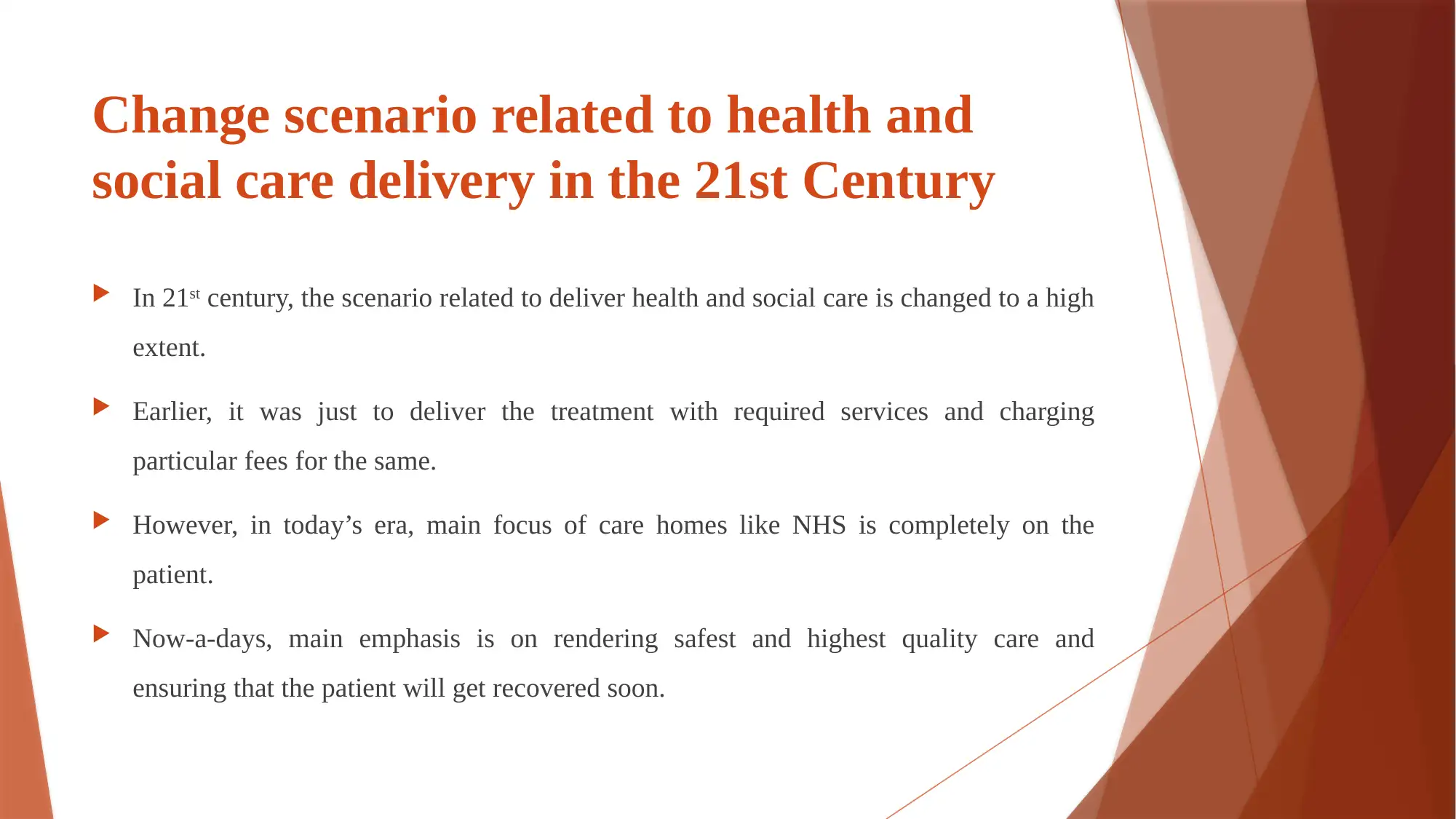
Change scenario related to health and
social care delivery in the 21st Century
In 21st century, the scenario related to deliver health and social care is changed to a high
extent.
Earlier, it was just to deliver the treatment with required services and charging
particular fees for the same.
However, in today’s era, main focus of care homes like NHS is completely on the
patient.
Now-a-days, main emphasis is on rendering safest and highest quality care and
ensuring that the patient will get recovered soon.
social care delivery in the 21st Century
In 21st century, the scenario related to deliver health and social care is changed to a high
extent.
Earlier, it was just to deliver the treatment with required services and charging
particular fees for the same.
However, in today’s era, main focus of care homes like NHS is completely on the
patient.
Now-a-days, main emphasis is on rendering safest and highest quality care and
ensuring that the patient will get recovered soon.
⊘ This is a preview!⊘
Do you want full access?
Subscribe today to unlock all pages.

Trusted by 1+ million students worldwide
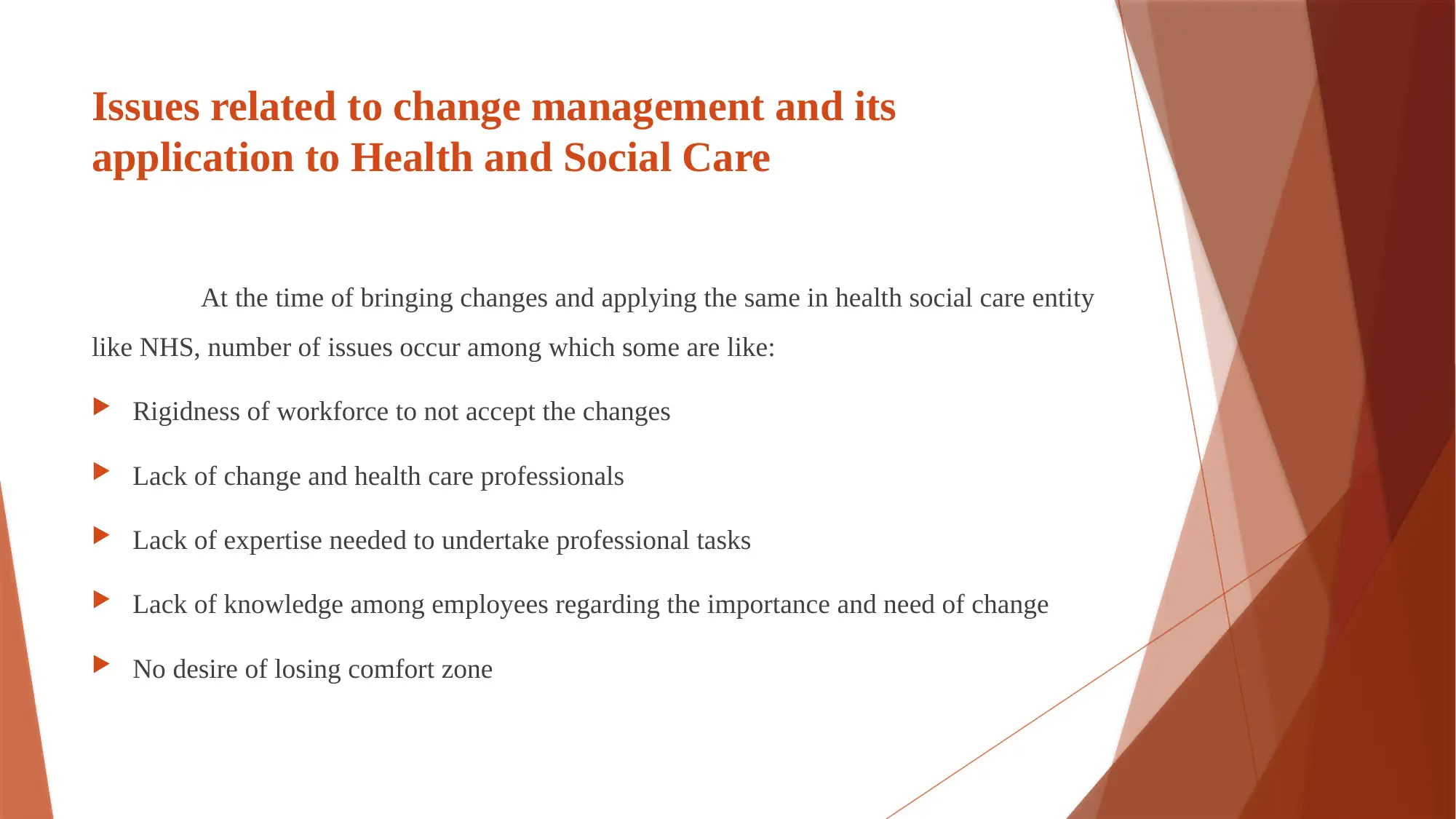
Issues related to change management and its
application to Health and Social Care
At the time of bringing changes and applying the same in health social care entity
like NHS, number of issues occur among which some are like:
Rigidness of workforce to not accept the changes
Lack of change and health care professionals
Lack of expertise needed to undertake professional tasks
Lack of knowledge among employees regarding the importance and need of change
No desire of losing comfort zone
application to Health and Social Care
At the time of bringing changes and applying the same in health social care entity
like NHS, number of issues occur among which some are like:
Rigidness of workforce to not accept the changes
Lack of change and health care professionals
Lack of expertise needed to undertake professional tasks
Lack of knowledge among employees regarding the importance and need of change
No desire of losing comfort zone
Paraphrase This Document
Need a fresh take? Get an instant paraphrase of this document with our AI Paraphraser

Chosen change scenario within health and
social care
NHS is planning to bring changes for delivering effective and high quality treatment to
the patients.
In NHS, the change scenario within health and social care that care workers may have
experienced is that for providing safest and highest quality services, many new and
advanced techniques are brought in the organization.
For the same, health and social care workers may experience the issue in using those
techniques.
It may have created an unhealthy working environment.
Also, stress may have occurred to them that have reduced their efficiency.
Confidence and motivational level may have reduced.
social care
NHS is planning to bring changes for delivering effective and high quality treatment to
the patients.
In NHS, the change scenario within health and social care that care workers may have
experienced is that for providing safest and highest quality services, many new and
advanced techniques are brought in the organization.
For the same, health and social care workers may experience the issue in using those
techniques.
It may have created an unhealthy working environment.
Also, stress may have occurred to them that have reduced their efficiency.
Confidence and motivational level may have reduced.

Factors influencing the change as well as
the type of change introduced
Major factors that influence the change as well as type of change introduced by
NHS are:
Organizational culture
Resistance
Teamwork
Degree of leadership support for the change
Communication in the firm
Organizational systems and processes
Structure of organization
the type of change introduced
Major factors that influence the change as well as type of change introduced by
NHS are:
Organizational culture
Resistance
Teamwork
Degree of leadership support for the change
Communication in the firm
Organizational systems and processes
Structure of organization
⊘ This is a preview!⊘
Do you want full access?
Subscribe today to unlock all pages.

Trusted by 1+ million students worldwide
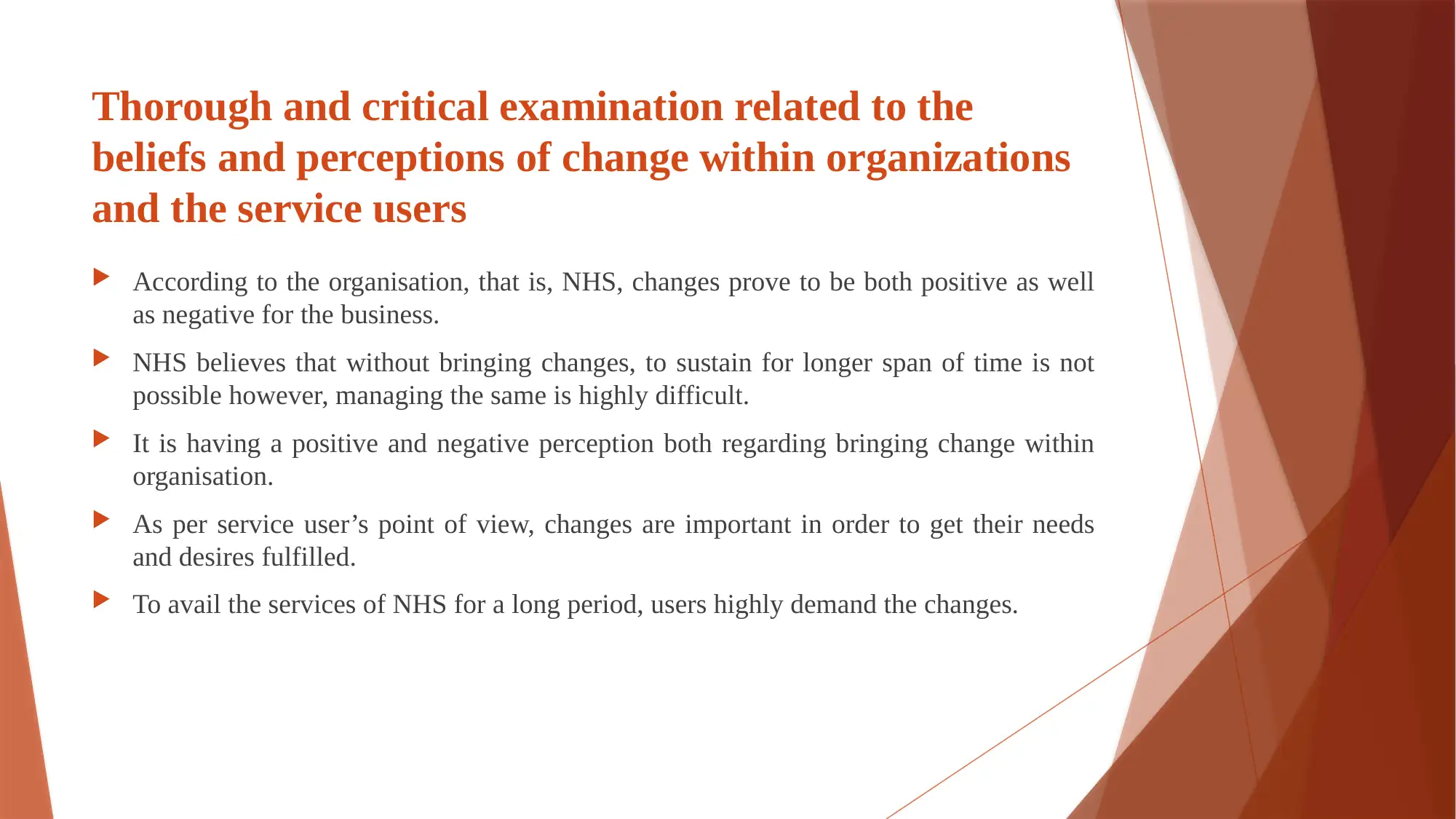
Thorough and critical examination related to the
beliefs and perceptions of change within organizations
and the service users
According to the organisation, that is, NHS, changes prove to be both positive as well
as negative for the business.
NHS believes that without bringing changes, to sustain for longer span of time is not
possible however, managing the same is highly difficult.
It is having a positive and negative perception both regarding bringing change within
organisation.
As per service user’s point of view, changes are important in order to get their needs
and desires fulfilled.
To avail the services of NHS for a long period, users highly demand the changes.
beliefs and perceptions of change within organizations
and the service users
According to the organisation, that is, NHS, changes prove to be both positive as well
as negative for the business.
NHS believes that without bringing changes, to sustain for longer span of time is not
possible however, managing the same is highly difficult.
It is having a positive and negative perception both regarding bringing change within
organisation.
As per service user’s point of view, changes are important in order to get their needs
and desires fulfilled.
To avail the services of NHS for a long period, users highly demand the changes.
Paraphrase This Document
Need a fresh take? Get an instant paraphrase of this document with our AI Paraphraser
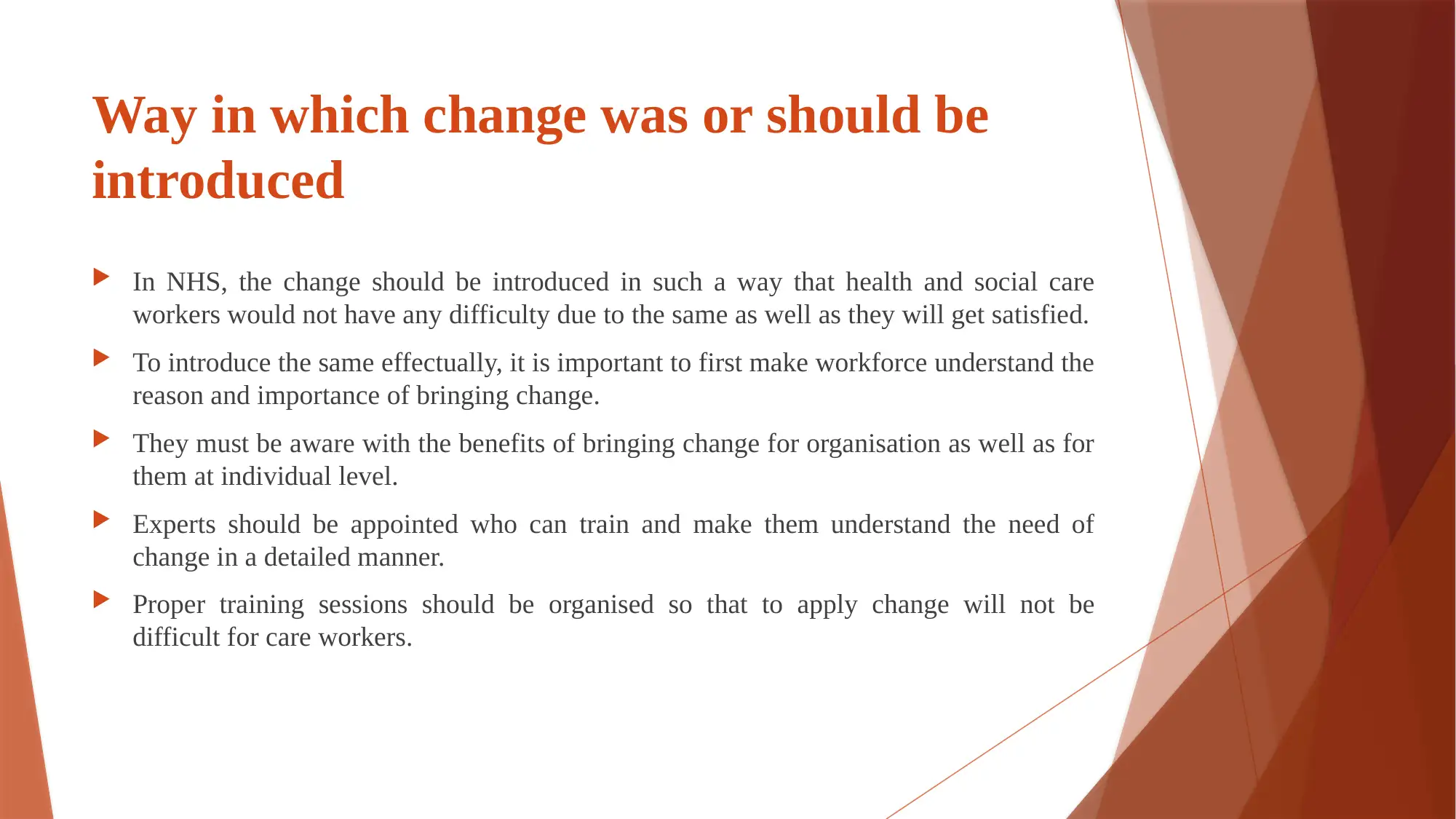
Way in which change was or should be
introduced
In NHS, the change should be introduced in such a way that health and social care
workers would not have any difficulty due to the same as well as they will get satisfied.
To introduce the same effectually, it is important to first make workforce understand the
reason and importance of bringing change.
They must be aware with the benefits of bringing change for organisation as well as for
them at individual level.
Experts should be appointed who can train and make them understand the need of
change in a detailed manner.
Proper training sessions should be organised so that to apply change will not be
difficult for care workers.
introduced
In NHS, the change should be introduced in such a way that health and social care
workers would not have any difficulty due to the same as well as they will get satisfied.
To introduce the same effectually, it is important to first make workforce understand the
reason and importance of bringing change.
They must be aware with the benefits of bringing change for organisation as well as for
them at individual level.
Experts should be appointed who can train and make them understand the need of
change in a detailed manner.
Proper training sessions should be organised so that to apply change will not be
difficult for care workers.
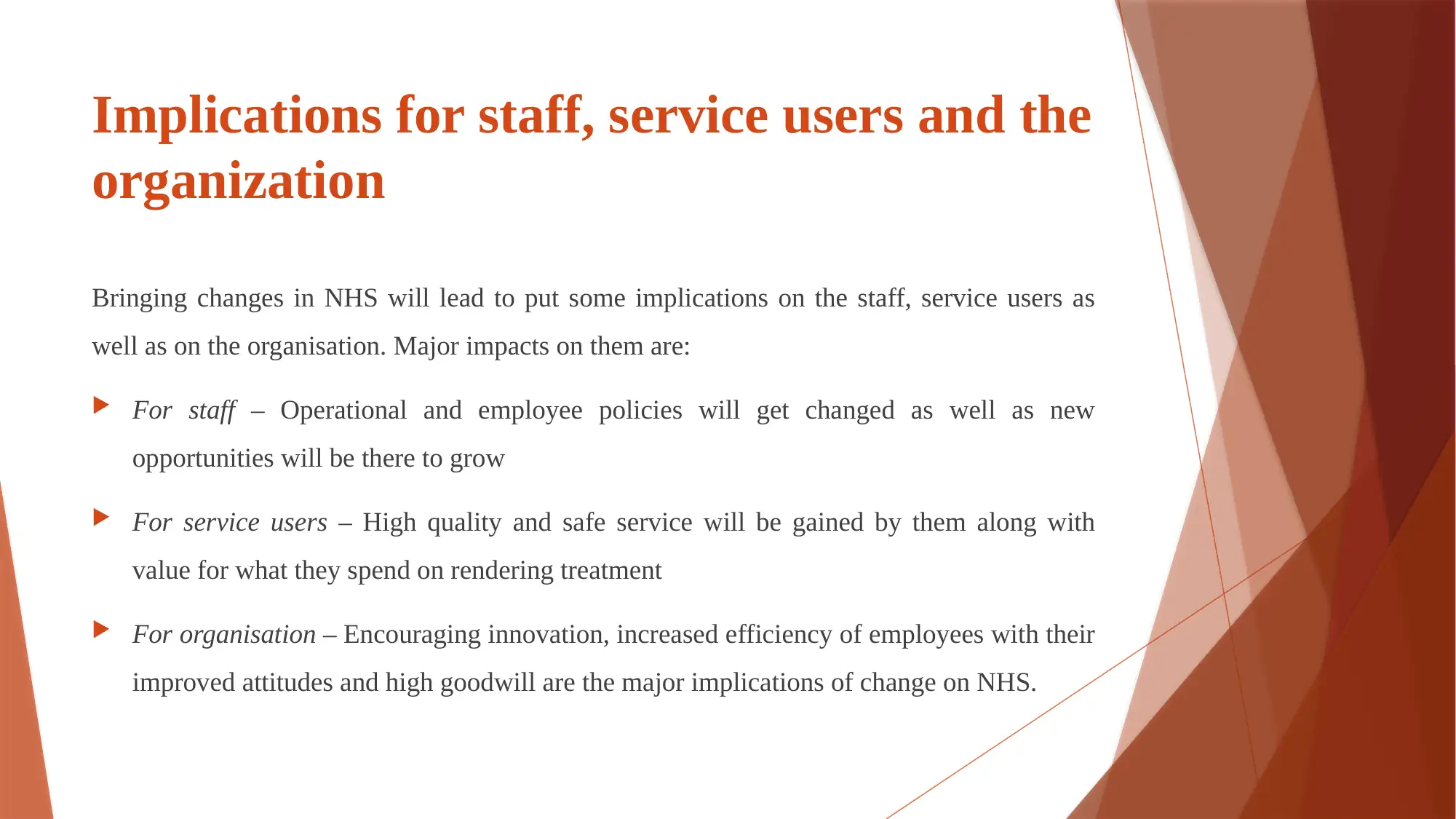
Implications for staff, service users and the
organization
Bringing changes in NHS will lead to put some implications on the staff, service users as
well as on the organisation. Major impacts on them are:
For staff – Operational and employee policies will get changed as well as new
opportunities will be there to grow
For service users – High quality and safe service will be gained by them along with
value for what they spend on rendering treatment
For organisation – Encouraging innovation, increased efficiency of employees with their
improved attitudes and high goodwill are the major implications of change on NHS.
organization
Bringing changes in NHS will lead to put some implications on the staff, service users as
well as on the organisation. Major impacts on them are:
For staff – Operational and employee policies will get changed as well as new
opportunities will be there to grow
For service users – High quality and safe service will be gained by them along with
value for what they spend on rendering treatment
For organisation – Encouraging innovation, increased efficiency of employees with their
improved attitudes and high goodwill are the major implications of change on NHS.
⊘ This is a preview!⊘
Do you want full access?
Subscribe today to unlock all pages.

Trusted by 1+ million students worldwide
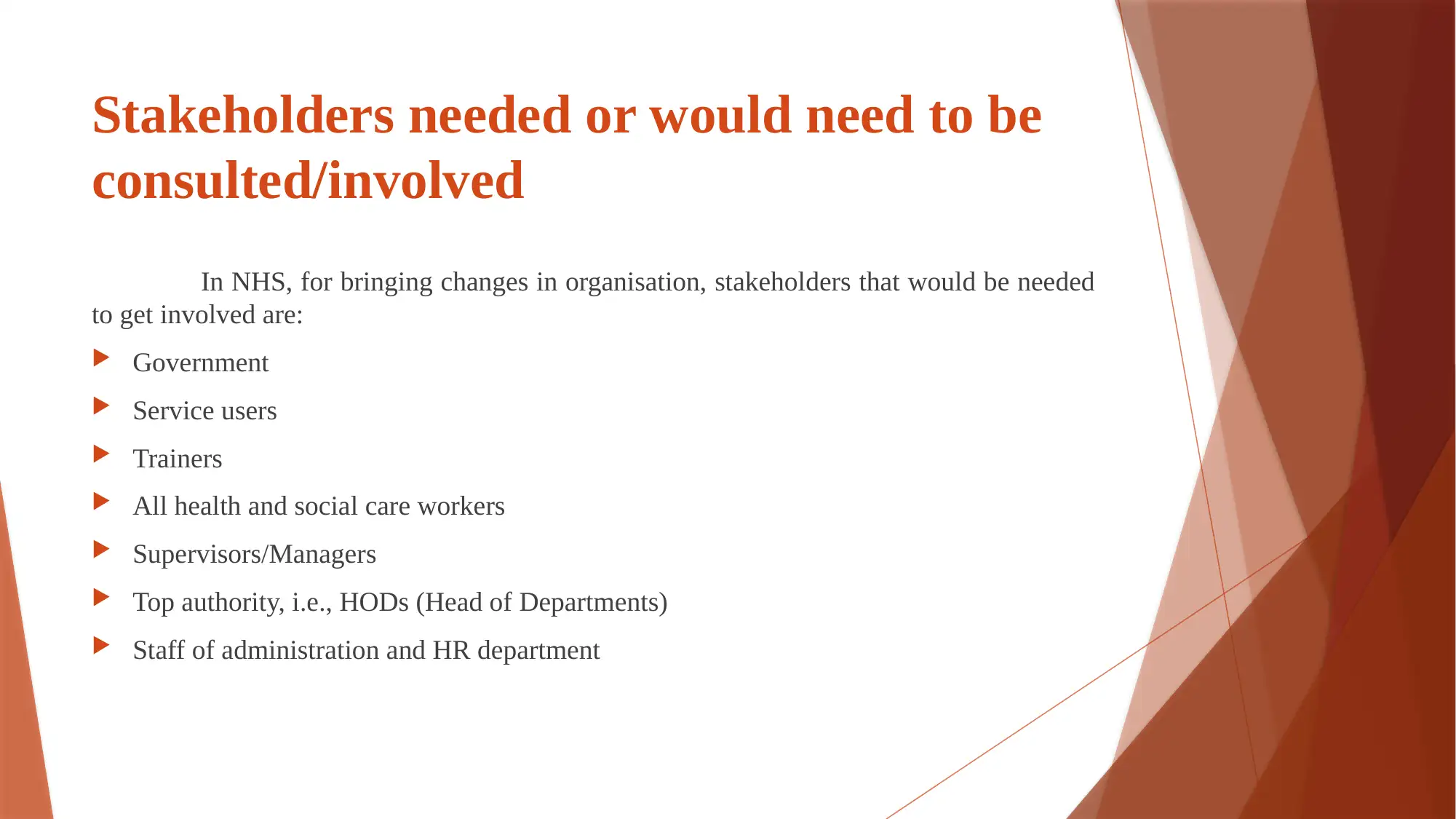
Stakeholders needed or would need to be
consulted/involved
In NHS, for bringing changes in organisation, stakeholders that would be needed
to get involved are:
Government
Service users
Trainers
All health and social care workers
Supervisors/Managers
Top authority, i.e., HODs (Head of Departments)
Staff of administration and HR department
consulted/involved
In NHS, for bringing changes in organisation, stakeholders that would be needed
to get involved are:
Government
Service users
Trainers
All health and social care workers
Supervisors/Managers
Top authority, i.e., HODs (Head of Departments)
Staff of administration and HR department
Paraphrase This Document
Need a fresh take? Get an instant paraphrase of this document with our AI Paraphraser
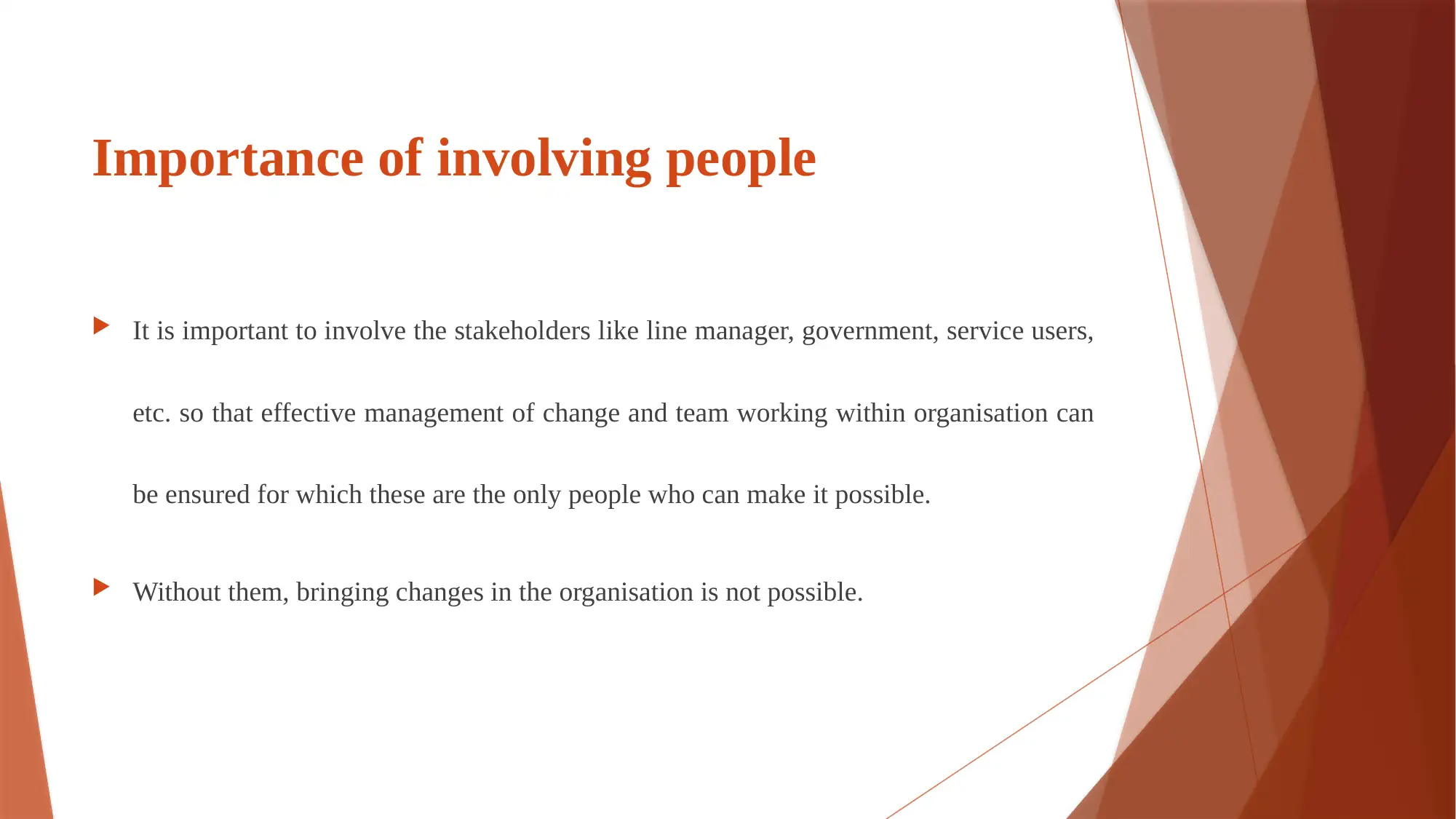
Importance of involving people
It is important to involve the stakeholders like line manager, government, service users,
etc. so that effective management of change and team working within organisation can
be ensured for which these are the only people who can make it possible.
Without them, bringing changes in the organisation is not possible.
It is important to involve the stakeholders like line manager, government, service users,
etc. so that effective management of change and team working within organisation can
be ensured for which these are the only people who can make it possible.
Without them, bringing changes in the organisation is not possible.

Impact of change upon managers and their ability to
implement effective and successful change in the
chosen scenario
Implementing effective and successful change in NHS will have a high impact on the
managers as well as on their ability to execute the same. This impact can be understood in the
following ways:
Increased knowledge and abilities
Improved leadership
Enhanced skills
Rise in the motivation and confidence level
Increase in stress as well
implement effective and successful change in the
chosen scenario
Implementing effective and successful change in NHS will have a high impact on the
managers as well as on their ability to execute the same. This impact can be understood in the
following ways:
Increased knowledge and abilities
Improved leadership
Enhanced skills
Rise in the motivation and confidence level
Increase in stress as well
⊘ This is a preview!⊘
Do you want full access?
Subscribe today to unlock all pages.

Trusted by 1+ million students worldwide
1 out of 20
Related Documents
Your All-in-One AI-Powered Toolkit for Academic Success.
+13062052269
info@desklib.com
Available 24*7 on WhatsApp / Email
![[object Object]](/_next/static/media/star-bottom.7253800d.svg)
Unlock your academic potential
Copyright © 2020–2025 A2Z Services. All Rights Reserved. Developed and managed by ZUCOL.



